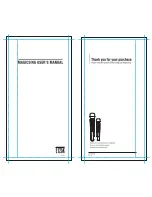
OM-250 147 Page 24
4-13. Pulser Control Settings (STH Models)
Pulsing is only available while using
a TIG process.
Select TIG process according to
Section 4-9.
1
Pulser LEDs
2
Ammeter And Parameter
Display (Meter)
3
Amperage/Set-Up Adjustment
Control
4
Pulser Control Switch
5
Pulser Light (LED)
Pulser light is on when pulser is on.
To enter Pulser set-up mode and
scroll through parameters, press
and release the Pulser Control
switch. Selected parameter will be
displayed on the meter and corres-
ponding LED lights.
Turn Amperage/Set-Up Adjust-
ment control to change value of se-
lected parameter. Value selected is
displayed on the meter.
6
Duty Cycle (%)
Use control to control weld puddle
cooling. Default is 50 percent
(min=0.1 percent, max=90 per-
cent).
7
Peak Current
Peak amperage is set using the
Amperage/Set-Up Adjustment con-
trol. Peak amperage is the highest
welding amperage allowed to occur
in the pulse cycle. Weld penetration
varies directly with peak amperage.
The default value=50 A.
8
Background Current (
A
b)
Use Background Amps control to
set the low pulse of the weld amper-
age, which cools the weld puddle
and affects overall heat input. Back-
ground Current is set as a percent-
age of peak amperage. Default is
40 percent (min=10 percent,
max=90 percent).
9
Pulse Frequency (Hz)
Pulse Frequency controls weld
bead appearance. Default=60Hz
(min=0.4 Hz, max=300Hz).
Application:
Pulsing refers to the alternating
raising and lowering of the weld out-
put at a specific rate. The raised
portions of the weld output are con-
trolled in width, height, and frequen-
cy, forming pulses of weld output.
These pulses and the lower amper-
age level between them (called the
background current) alternately
heat and cool the molten weld
puddle. The combined effect gives
the operator better control of pene-
tration, bead width, crowning, un-
dercutting, and heat input.
4
2
3
1
%
A
b
H
Z
6
7
8
9
5
















































